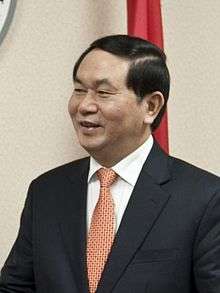11th Politburo of the Communist Party of Vietnam
The 11th Politburo of the Central Committee of the Communist Party of Vietnam was elected by the 11th Central Committee on 19 January 2011 in the aftermath of the 11th National Congress. 14-members were elected, with Trương Tấn Sang, the President of Vietnam, becoming the highest-ranked member. Of the 14 members, five of them were new to the Politburo (Trần Đại Quang, Tòng Thị Phóng, Ngô Văn Dụ, Đinh Thế Huynh and Nguyễn Xuân Phúc).[1] Nguyễn Phú Trọng, ranked eighth, was elected General Secretary of the Central Committee – as General Secretary he presides over the work of the Central Committee, the Secretariat and the Politburo.[2]
The 11th Politburo, and in particular Prime Minister Nguyễn Tấn Dũng, the third ranked member, has been criticised over its handling of the Vietnamese economy. In the aftermath of the 6th plenum of the Central Committee (held 1–15 October 2012),[3] Nguyễn Phú Trọng issued an official apology to the people of Vietnam, saying "The Politburo and Secretariat for many terms now have made some big mistakes, especially having not prevented and remedied corruption and the deterioration among some party members,” further stating that “Some senior officials, those currently in office as well as former ones, have occasionally not been morally good role models through their lifestyles and those of their families. They have significantly impacted the prestige of the party and the state."[4] He specified that the Central Committee choose not to dissolve the 14-member 11th Politburo, even if one of its members (later proven to be Nguyễn Tấn Dũng), "was deserving of punishment."[4] Later, at a convocation of the National Assembly, Nguyễn Tấn Dũng apologised to the Vietnamese people; "I recognise my political responsibility and my faults" over his handling of the Vietnamese economy.[5]
According to Tuong Vu, an associate professor at the University of Oregon, there exists a rivalry between Trương Tấn Sang, Nguyễn Phú Trọng, Nguyễn Sinh Hùng, the Chairman of the National Assembly, and others against Nguyễn Tấn Dũng and his supporters.[6][7] According to several diplomats and Western academics, Trương Tấn Sang, during the run-up to the 11th National Congress, tried to supplant Nguyễn Tấn Dũng as prime minister. In this he failed, and he was instead appointed to the largely ceremonial post of President. One of the most outstanding critiques of Nguyễn Tấn Dũng's economic policy is his handling of the state-owned sector; state companies have preserved Soviet-like working ethics, together with large loans, and overextended growth led to a meltdown of two high-profile state-owned companies; both Vinashin and Vinalines both required government rescue.[8] Nguyễn Tấn Dũng's has also been criticised by his handling of corruption; several corruption scandals became public during his first term as prime minister. Following the 6th plenum of the Central Committee, Nguyễn Phú Trọng said a vote of confidence would be introduced in 2013.[9]
Two additional members were elected to the 11th Politburo at the 7th plenum of the 11th Central Committee on 11 May 2013.
Members
| Rank [note 1] |
Portrait | Name (birth–death) |
Member since | Duration | Party position(s) | State position(s) |
|---|---|---|---|---|---|---|
| 1 |  |
Trương Tấn Sang (born 1949) |
6 May 1996 | 20 years, 213 days |
|
|
| 2 | Phùng Quang Thanh (born 1949) |
25 April 2006 | 11 years, 224 days |
|
||
| 3 | .jpg) |
Nguyễn Tấn Dũng (born 1949) |
6 May 1996 | 20 years, 213 days |
|
|
| 4 | Nguyễn Sinh Hùng (born 1946) |
25 April 2006 | 10 years, 224 days |
|
| |
| 5 | Lê Hồng Anh (born 1949) |
22 April 2001 | 15 years, 227 days |
|
— | |
| 6 | Lê Thanh Hải (born 1950) |
25 April 2006 | 10 years, 224 days |
|
— | |
| 7 | Tô Huy Rứa (born 1947) |
1 January 2009 | 7 years, 339 days |
|
— | |
| 8 |  |
Nguyễn Phú Trọng (born 1944) |
27 December 1997 | 18 years, 344 days |
|
— |
| 9 | Phạm Quang Nghị (born 1949) |
25 April 2006 | 10 years, 224 days |
|
— | |
| 10 |  |
Trần Đại Quang (born 1956) |
19 January 2011 | 5 years, 321 days |
|
|
| 11 | Tòng Thị Phóng (born 1954) |
19 January 2011 | 5 years, 321 days |
|
| |
| 12 | Ngô Văn Dụ (born 1947) |
19 January 2011 | 5 years, 321 days |
|
— | |
| 13 |  |
Đinh Thế Huynh (born 1953) |
19 January 2011 | 5 years, 321 days |
|
— |
| 14 |  |
Nguyễn Xuân Phúc (born 1954) |
19 January 2011 | 5 years, 321 days |
|
|
| 15 |  |
Nguyễn Thiện Nhân (born 1953) |
11 May 2013 | 3 years, 208 days | — |
|
| 16 |  |
Nguyễn Thị Kim Ngân (born 1954) |
11 May 2013 | 3 years, 208 days |
|
|
Notes
- ↑ The Central Committee when it convenes for its first session after being elected by a National Party Congress elects the Politburo.[10] According to David Koh, in interviews with several high-standing Vietnamese officials, the Politburo ranking is based upon the number of approval votes by the Central Committee. Lê Hồng Anh, the Minister of Public Security, was ranked 2nd in the 10th Politburo because he received the second-highest number of approval votes. Another example being Tô Huy Rứa of the 10th Politburo, he was ranked lowest because he received the lowest approval vote of the 10th Central Committee when he standing for election for a seat in the Politburo. This system was implemented at the 1st plenum of the 10th Central Committee.[11] Another theory is that the Politburo ranking functioned as an official order of precedence before the 10th Party Congress, and some believe it still does.[10]
References
- ↑ "Nguyen Phu Trong elected Party General Secretary". Nhân Dân. Central Committee of the Communist Party of Vietnam. 19 January 2011. Retrieved 26 October 2012.
- ↑ "Điều lệ Đảng Cộng sản Việt Nam thông qua tại Đại hội đại biểu toàn quốc lần thứ XI của Đảng" [Charter of the Communist Party of Vietnam which was approved at the 11th National Congress]. 11th National Congress of the Communist Party of Vietnam. Retrieved 26 October 2012.
- ↑ "Party Central Committee's 6th plenum closes". Vietnamnet.vn. 16 October 2012. Retrieved 16 October 2012.
- 1 2 "Vietnam's Communist Party Admits Mistakes as Dung Keeps Job". Bloomberg Businessweek. 26 October 2012. p. 1. Retrieved 16 October 2012.
- ↑ "Vietnam's prime minister admits 'faults' on economy". BBC Online. 22 October 2012. Retrieved 26 October 2012.
- ↑ "Vietnam's Communist Party Admits Mistakes as Dung Keeps Job". Bloomberg Businessweek. 16 October 2012. p. 2. Retrieved 16 October 2012.
- ↑ Hunt, Luke (11 January 2011). "Vietnam's 2020 Vision". The Diplomat. Retrieved 26 October 2012.
- ↑ Brown, David (13 September 2012). "Viet Prime Minister under Threat". Asia Sentinel. pp. 1–3. Retrieved 26 October 2012.
- ↑ Vuving, Alexander (25 October 2012). "Vietnam's Search for Stability". The Diplomat. Retrieved 26 October 2012.
- 1 2 Van & Cooper 1983, p. 69.
- ↑ Koh 2008, p. 666.
Bibliography
- Koh, David (July–August 2008). "Leadership Changes at the 10th Congress of the Vietnamese Communist Party". Asian Survey. University of California Press. 48 (4): 650–672. doi:10.1525/as.2008.48.4.650.
- Van, Canh Nguyen; Cooper, Earle (1983). Vietnam under Communism, 1975–1982. Hoover Press. ISBN 9780817978518.
